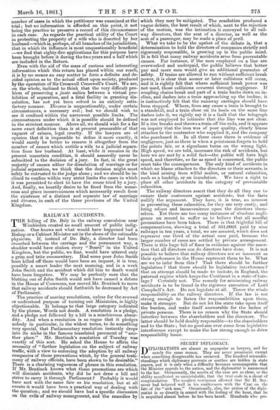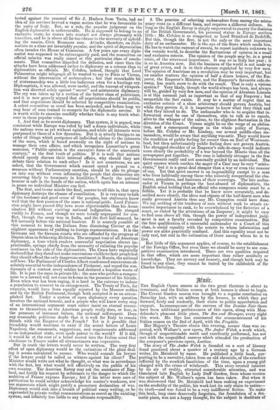SECRET DIPLOMACY. D IPLOMATISTS are almost as unpopular as lawyers, and
for nearly the same reason. They are never prominent except when something disagreeable has occurred. The hundred misunder- standings which diplomacy prevents or soothes are hidden in state papers, and it is only when a difficulty becomes unmanageable that the Minister appeals to the nation, and the diplomatist is summoned to the bar. Occasionally, the merits of the case are so clear, or the ability manifested so unmistakable, that the trial ends in a shout of congratulation. The smallest vestryman allowed that Sir H. Sey- mour had behaved well in his conferences with the Czar on the fate of the "sick man." Occasionally, also, the action of the diplo- matist is so directly in accord with the feeling of the hour, that he is acquitted almost before he has been heard. Hundreds who pro- tested against the removal of Sir J. Hudson from Turin, had no idea of his services beyond a vague notion that he was favourable to the unity of Italy. but, as a rule, the popular judgment on the English diplomatist is unfavourable. Ile is supposed to belong to an exclusive caste, he comes into contact not always pleasantly with travellers, and he is above all far too obtuse to the necessity of uphold- ing the maxim, Civis Romanus sum. Attacks, therefore, on diplo- matists as a class are invariably popular, and the spirit of depreciation often invades the House of Commons. A few years ago every diplo- matist was supposed to be extravagantly paid, and the committee on official salaries was really aimed at this particular class of emolu- ments. That committee dispelled the delusion, and since then the attacks have been addressed rather to diplomacy as a science than to diplomatists as officials. Mr. Cobden, indeed, thought that Lord Palmerston might telegraph all he wanted to say to Paris or Vienna, without the intervention of ambassadors ; but that remarkable bit of statesmanship was a little too ludicrous even for a hustings cry. Diplomatists, it was allowed, were useful, and the torrent of vitupera- tion wai directed solely against "secret" and aristocratic diplomacy. The cry was taken up by a section of the better class of politicians, and it is now gravely argued that all negotiations should be public, and that negotiators should be selected by competitive examination. A select committee as usual has been conceded, and before long we may hear of men trained to compete for the diplomatic service. It is worth while to examine candidly whether there is any truth what- ever in these popular cries.
1. And first as to secret diplomacy. That system, it is argued, was consistent while Europe was ruled by half a dozen individuals, while the nations were as yet without opinions, and while all interests were postponed to those of a few dynasties. But it is utterly foreign to an order of things which postpones all individual claims to the interests of the mass, which is based avowedly on the right of nations to manage their own affairs, and which recognizes Lamartine's great sentence, "Public opinion is the executive force of the nineteenth century," as the first truth of politics. If it is well that nations should openly discuss their internal affairs, why should they not debate their relation to each other ? Is it not monstrous, we are asked, that the Government which cannot spend a pound on a museum without Parliamentary sanction, should be able to plunge us into war without even informing the people that discussions are occurring likely to terminate in hostilities ? Surely the national honour is safe in the hands of the nation, which again has an interest in peace no individual Minister can feel.
The first, and to our minds the final, answer to all this is, that open diplomacy destroys the chance of conciliation. It is very easy to talk of the bonhomie and good sense of the peoples, but statesmen know well that the first passion of the mass is national pride. Lord Palmer- ston might have passed fifty laws more objectionable than his Assas- sination Bill without exciting national indignation. He stooped visibly to France, and though we were totally unprepared for con- flict, though the army was in India, and the fleet half-manned, he fell instantly before the national hauteur. It is scarcely possible at this moment to keep the Italians from dismissing Cavour at the slightest appearance of yielding to foreign representations. It is the Germans not the German courts who are offended by the progress of Danish ideas in Schleswig-Holstein. The arrogant tone of all American diplomacy, a tone which renders successful negotiation almost ins- practicable, springs chiefly from the necessity of enlisting the popular sentiment on the side of the diplomatists. The Czars have repeatedly declared that they dared not make concessions visibletotheir people lest , they should offend the only dangerous sentiment in Russia, the national self-love. The Parliament of Charles Albert condemned concessions ab- solutely essential to the independence of Piedmont, and urged the con- tinuance of a contest every soldier had declared a hopeless waste of life. It is just the same in private life : the man who prefers a compro- mise to a lawsuit will not come to terms in the presence of his friends. Even when war has been raging, it is hard in the extreme to induce a population to consent to an arrangement. The Treaty of Paris, for example, would have been equally rejected by the Moscow nobles and by the British Parliament, though both accepted it as an accom- plished fact. Under a system of open diplomacy every question involves the national honour, and a people who will know every step of an international argument must either insist on eternal conces- sion to themselves, as the American people really does, or lose, in the presence of incessant failure, the national self-respect. Does any reasonable politician doubt that it is well for Italy to remain friends with the Emperor of the French? Yet is it possible that friendship would continue to exist if the secret letters of Louis Napoleon, the commands, suggestions, and requirements addressed to an independent state, were made patent to the world ? If it did, it would be at the cost of a belief rooted into the Italian mind that obedience to France under all circumstances was imperative.
But in truth the letters would never be written. The very first effect of open diplomacy would be the extinction of the plain deal- ing it seems calculated to ensure. Who would consult his lawyer if the lawyer could be called as witness against his client? The Minister would write not what he thought, or what was in accordance with the fact, but what would tell effectively on the public of his own country. The Austrian Envoy may ask the assistance of land, and fortify his request by references to the danger to which the ambition of France exposes Europe ; but if his letter were sure of publication he could neither acknowledge his master's weakness, nor use arguments which might justify a premature declaration of war. Diplomacy would sink into a branch of political essay writing, or be superseded by private verbal communications as secret as the existing system, and infinitely less liable to any ultimate responsibility.
2. The practice of selecting ambassadors from among the aristo- cracy rests on a different basis, and requires a different defence. So long as the English Envoy is simply empowered to convey the deaision of the British Government, his personal status in Europe matters little: Mr. Cobden is as competent as Lord Stratford de Redelitre. But Ws, though the first, is not the only or the most important duty of an ambassador. He is the eye of the State which sends him. He has to watch the current of events, to report incidents unknown to the outside world, to describe the fluctuations of opinion in a small and exclusive coterie. The opinion of the people may be, in a great crisis,. of the uttermost importance. It was so in Italy last year ; it is so in America now. But the business of the world is not made up of great crises, and is in their absence regulated by very few men. The opinion of Austrians on a revolution may be very important, but on smaller matters the opinion of half a dozen houses, of the Em- peror, the Emperor's Minister, and the Emperor's favourite aide-de- camp, has much more to do with the result. That is only a vicious system ? Very likely, though the world always has been, and always will be, guided by very few men and the opinion of Abraham Lincoln is at this moment just as important as that of any Emperor ; but meanwhile the fact exists. It may be a matter of regret that an exclusive coterie of a close aristocracy should govern Austria, but while they govern it, it is important to know what they think and what they intend to do. The ambassador who is to acquire that in- formation must be one of themselves, able to talk as to equals, alive to the whisper of the salons, to the slightest fluctuation in the direction of the Court. Vienna might be on the verge of an abdica- tion, and a consequent change in the whole policy. of Europe, before Mr. Cobden or Mr. Lindsay, our newest middle-class am- bassadors, would be aware that anything was astir. They would know the condition of public feeling far sooner than an Earl of Westmore- land, but then unfortunately public feeling does not govern Austria. The shrugged shoulder of an Emperor's aide-de-camp would indicate more clearly the probability of a war beyond the Mmcio than all the newspapers put together. The case is infinitely stronger in the few Governments really and not nominally guided by an individual. The quiet answer which soothes the anger of a Czar may be very "aristo- cratic," but it is a great deal cheaper than a war or even the rumour of one. Yet that quiet answer is an impossibility except to a man who lives habitually among those who minutely comprehend the cha- racter, prejudices, and humours of their sovereign. The late ambas- sador at Vienna is perhaps the best-abused of diplomatists, the English mind holding that an official who composes music must be a fribble. Yet it is probable that he knew more accurately, and de- scribed more clearly, the ideas and objects of the half-dozen men who really governed Austria than any Hr. Crampton could have done. We say nothing of the tendency of men without rank to attach ex- cessive importance to rank, to he overwhelmed by the flatteries of a court, or elated by the attentions of an Emperor; it might be easy to find men above all this, though the power of independent judg- ment is not a faculty revealed by competitive examination. But the first qualification of a successful ambassador to a Court of this class, is social equality with the coterie to whom information and power are alike practically confined. And this equality must not be only real, but real in the estimation of those among whom he is to live.
But little of this argument applies, of course, to the establishment of the Foreign Office, but even there we should be sorry to see com- petitive examination introduced. There are two qualities required in that office, which are more important than either assidiuty or knowledge. They are secrecy and honesty, and though both may be found in any class, they cannot be tested by the shibboleth of Sir Charles Trevelyan.































 Previous page
Previous page